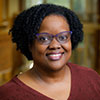Southeast Science Bootcamps started 5 years ago at N.C. State University’s Hunt Library.
I 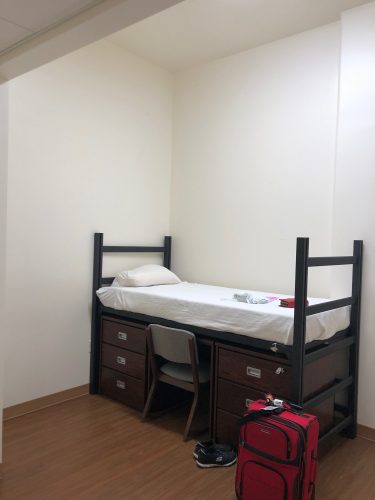 attended the fourth Southeast Science Bootcamp from May 28th-31, 2019 at Vanderbilt University. We stayed in a student dormitory, which brought back college flashbacks of living without A/C. I felt like I tried my life every night climbing into and out of the elevated bed utilizing the desk chair as a scaling device. As 41 out of 50 STEM librarians stayed in the residence hall, we were in good company.
attended the fourth Southeast Science Bootcamp from May 28th-31, 2019 at Vanderbilt University. We stayed in a student dormitory, which brought back college flashbacks of living without A/C. I felt like I tried my life every night climbing into and out of the elevated bed utilizing the desk chair as a scaling device. As 41 out of 50 STEM librarians stayed in the residence hall, we were in good company.
Denice’s Reflections
Prof. Douglas C. Schmidt “Surveillance Capitalism and You”
I cannot tell a lie. Dr. Douglas Schmidt scared me. He reflected on George Orwell’s sci fi novel “1984,” discussed social surveillance socialism, and transitioned into the copious amount of data that Google collects on a variety of platforms. I 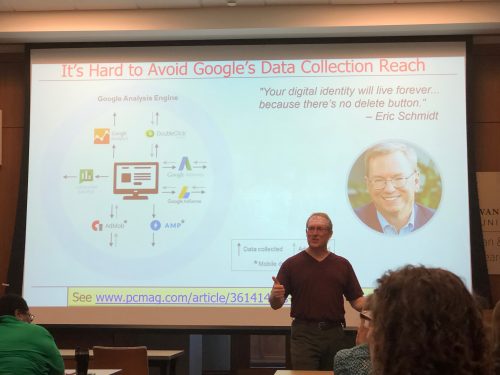 double dare you to read his paper “Google Data Collection” if you have an Android phone, use Google, Hulu, and/or YouTube, or simply click your mouse, press a button on your smartphone, and perform a transaction online. What exacerbates the matter is that Google buys credit card data from credit card companies and compares it to the information collected to draw conclusions about who you are, what you think, and what you currently or could buy. Although Europe has legislated data protections with the GDPR, the U.S. lags behind providing those same or stricter protections for American citizens. However, that pales to the Social Credit System that China will mandate for its citizens in 2020. Think about a system tracking every move you made, every item you purchase, the timeliness in which you pay your bills, etc. which in turn apply an algorithm on the data and make a determination on whether or not you are “trustworthy.”
double dare you to read his paper “Google Data Collection” if you have an Android phone, use Google, Hulu, and/or YouTube, or simply click your mouse, press a button on your smartphone, and perform a transaction online. What exacerbates the matter is that Google buys credit card data from credit card companies and compares it to the information collected to draw conclusions about who you are, what you think, and what you currently or could buy. Although Europe has legislated data protections with the GDPR, the U.S. lags behind providing those same or stricter protections for American citizens. However, that pales to the Social Credit System that China will mandate for its citizens in 2020. Think about a system tracking every move you made, every item you purchase, the timeliness in which you pay your bills, etc. which in turn apply an algorithm on the data and make a determination on whether or not you are “trustworthy.”
Prof. Jonathan Gilligan “Power, Privacy, and Participation in the Panopticon: Challenges and Opportunities to Inclusive Governance of the Smart City”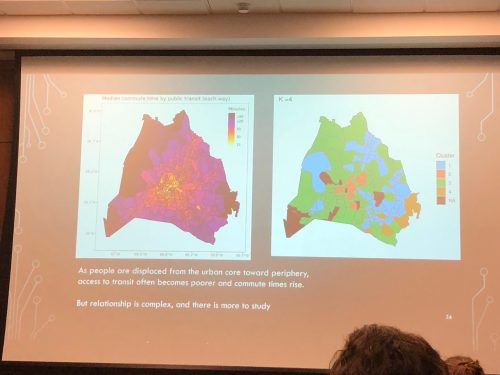
Dr. Jonathan Gilligan opened by sharing the individuals who influenced him from Sheila Jasanoff and her work on science, technology and governance to Robert P. Moses a proponent of teaching algebra as a civil rights struggle. He moved to discussing public participation in creating crowdsourcing and used the example of finding public restrooms in New York which was done using Mappler. Dr. Gilligan detailed how the research team applied publically available data to forecast gentrification in Nashville where on average 100 people move into Nashville each day. The eyebrow raising portion of the presentation centered on the technological and financial changes to video surveillance. Increased video surveillance and the use of facial recognition has enabled law enforcement to solve crimes. On the flip side, the same technology has been utilized by law enforcement for nefarious purposes. In addition, facial recognition fails to accurately identify females and minorities. Challenges regarding privacy, equity, transparency, and accountability still exist.
Profs. Helen Shin and Douglas H. Fisher “The Ethics of Artificial Intelligence”
I loved the fact that Dr. Haerin Shin from the English department and Dr. Douglas H. Fisher from the Computer Science and Computer Engineering departments co-taught the course “The Ethics of Artificial Intelligence.” They went through the course development and content. It was interesting to see them present with Dr. Shin presenting from a remote location via Skype and Dr. Fisher presenting in the room in person. It took me back to my corporate America days e.g. synthesizing multiple people in diverse geographic locations for a single meeting.
Reflections from a fellow STEM librarian
Prof. Jay Clayton “Overexposed: Genetic Privacy at the Multiplex”
Genetic privacy has been an issue for years, and a 2013 Forbes article was published entitled, a “Harvard Professor Re-identifies Anonymous Volunteers in a DNA Study.” In 2014, the NIH Genomic Data Sharing Policy was announced. English Professor Jay Clayton and Biomedical Informatics Professor Bradley Malin talked about their collaborative, transdisciplinary research at The Center for Genetic Privacy and Identity in Community Settings (GeT PReCiSe), which is a National Institutes of Health Center of Excellence in Ethics Research. Their publications are here if you’d like to read more about it. I found their talks fascinating as it relates to my genetic data literacy instruction, and my reading list has grown.
Prof. Keivan Stassun “Astrophysics Research in the Era of Big Data”
Dr. Keivan Stassun talked about the era of 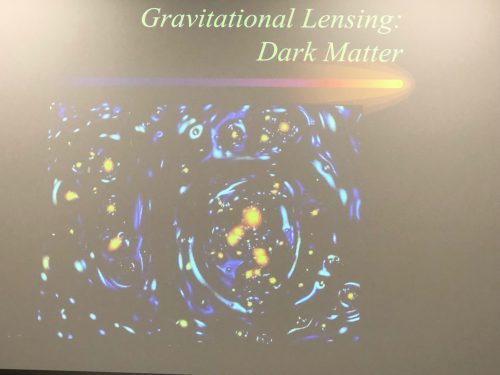 astroinformatics research, where the rate and pace of data accumulation is so fast that we need it curated, archived, and cross-referenced with simulation data. The famous Sloan Digital Sky Survey (SDSS) is being superseded by the next-generation Large Synoptic Survey Telescope (LSST), which is mapping the entire Southern sky from Chile every few days and collecting 30 TB of data every night.
astroinformatics research, where the rate and pace of data accumulation is so fast that we need it curated, archived, and cross-referenced with simulation data. The famous Sloan Digital Sky Survey (SDSS) is being superseded by the next-generation Large Synoptic Survey Telescope (LSST), which is mapping the entire Southern sky from Chile every few days and collecting 30 TB of data every night.
Dr. Stassun’s research focuses on the TESS (Transiting Exoplanet Survey Satellite) Mission, which was launched from Cape Canaveral in 2019 and will spend the next two years in orbit to find exoplanets and red dwarf stars in the solar neighborhood. I asked Dr. Stassun about his research project timeline, and he replied that it took 8 years to prepare for the launch, and he expects that it will take 5 years to analyze the data collected by the satellite. He posed the question to the audience full of STEM librarians, “What kind of metadata is needed so that astroinformatics data maintains their utility for years to come?”
Data Blitz: Librarian Lightning Talks
Thursday
Erich Purpur at the University of Virginia talked about his support for research projects with GIS and Python such as tracing an eagle’s flight path in real time using Google Earth. Jennifer Putnam Davis and Sandra Bandy at Augusta University talked about their participation in Lyrasis’s ORCID Program and raising awareness among faculty about integrating ORCID IDs with Digital Measures. Marcelle Savoy talked about her experience as an embedded field librarian at Florida State University Coastal Marine Lab for a research trip, where she traded her cardigan for a lab coat and taught database searching for marine biology student researchers. Ellen Brown at Austin Peay State University developed a science communication course mapped to the American Chemical Society’s (ACS) Approval Standards for future chemistry high school teachers.
Friday
Denise Wetzel shared how they rebranded and promoted the FAMU-FSU Engineering Library which is a collaboration between Florida State University and FAMU. Liz Waltman from the National Network of Libraries of Medicine/Atlantic Region discussed hosting Edit-a-Thons to improve Wikipedia health information. Isabella Baxter from the University of Tennessee Knoxville reviewed how they transformed their bibliographic instruction for Animal Science 100 into two games e.g. a Kudzu-themed breakout game similar to escape rooms and Pendergrass Clue. Lastly, Sarah Drerup from the University of Louisville expanded on strategies for providing data services without a data services librarian.
The Wondry Makerspace
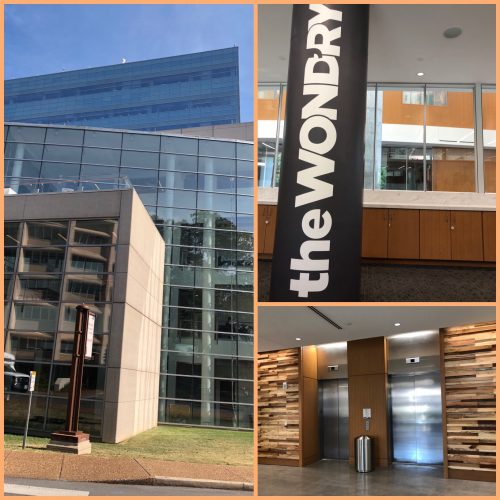
We trudged across campus in what felt like the hottest and most humid part of the day to visit the Wondry. Deana N. Meador the Program Manager at the Wondry toured the group through the 2 separate makerspaces as well as space utilized for the entrepreneurial classes and displays. The interior of the building repurposed trees that were torn down to clear the land.
Note: Vanderbilt as an arboretum either relocated or repurposed the trees.
Ubering Around Nashville
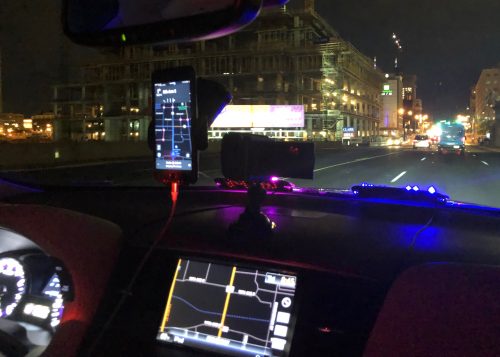
Our Uber experiences to Cafe Intermezzo and Saltine were memorable with Denice’s rendition of Tina Turner’s Private Dancer in the karoake Uber with disco lights, puppy love from another Uber, and great conversation with an Uber driver who lost his way to Vanderbilt.
Live. Love. Uber.
